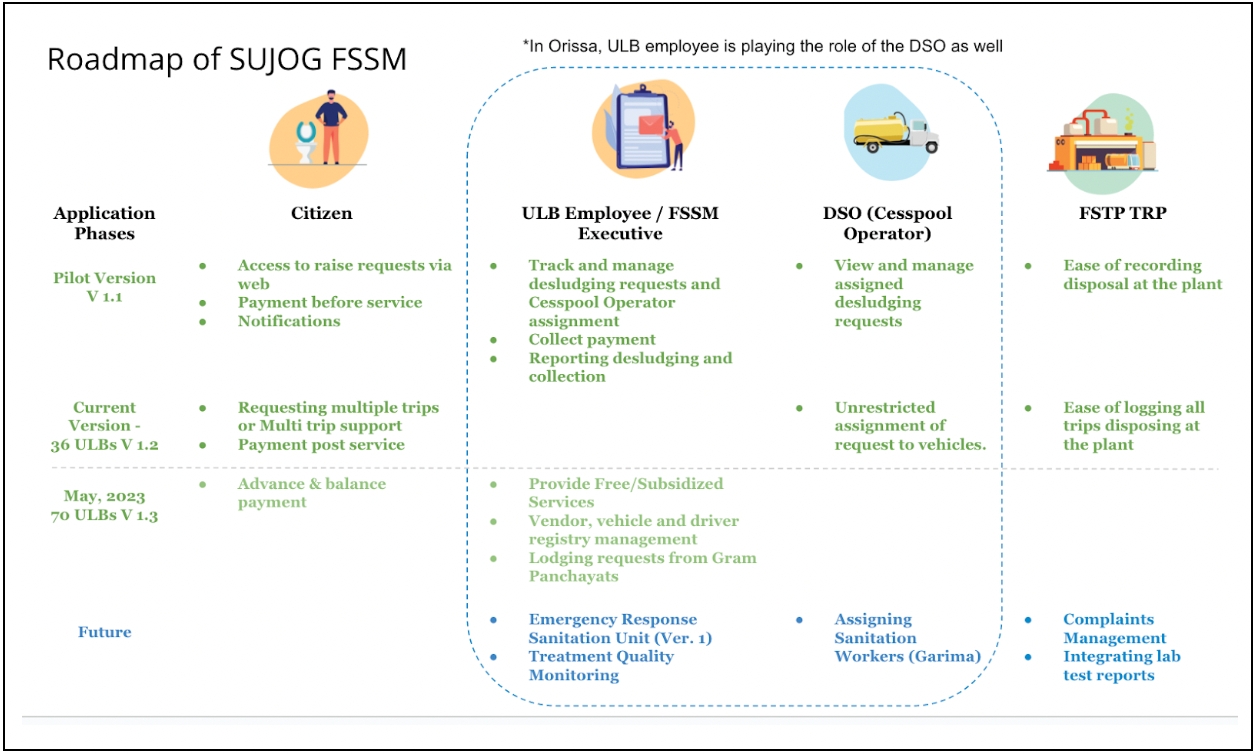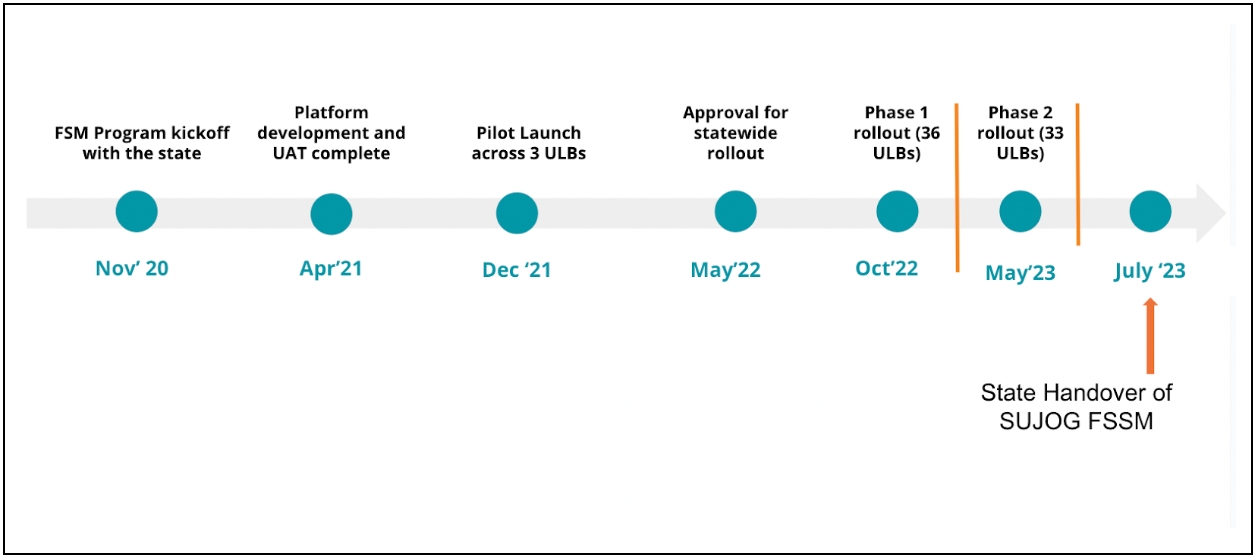Odisha - SUJOG
Sustainable Urban Services in a Jiffy by Odisha Government
Last updated
Sustainable Urban Services in a Jiffy by Odisha Government
Last updated
All content on this page by eGov Foundation is licensed under a Creative Commons Attribution 4.0 International License.
The Government of Odisha (GoO) has initiated a programme called "SUJOG - Sustainable Urban Services in a Jiffy by Odisha Government" through the Housing and Urban Development Department (H&UDD). The primary objective of this programme is to implement e-governance services across the Urban Local Bodies (ULBs) in the state. Its aim is to ensure that urban services are delivered to citizens in a seamless, transparent, and trackable manner. The programme has successfully been implemented in 115 ULBs in Odisha, and citizens can access these services through the DIGIT platform.
Facilitating effective sanitation management, the DIGIT Sanitation platform is currently live in 70 ULBs in Odisha. This platform specifically focuses on managing Feacal Sludge Management (FSM) in these areas. The programme aims to bring a paradigm shift in the way urban governance happens in the state by way of digitalisation. Its beneficiaries include citizens, the ULB administration, various government departments, and several other actors involved in the service delivery value chain.
One of the leading states in the domain of urban Faecal Sludge and Septage Management (FSSM), Odisha has already demonstrated effective city-wide FSSM systems in several ULBs with the commissioning of 108 FSTPs across 107 cities by September 2022, with further scale-up across all 115 ULBs underway. To ensure the continued and efficient delivery of FSSM services to all its citizens, the state has partnered with eGov Foundation (eGov) to roll out a Digital FSSM platform for managing the ULB-level operations and monitoring the performance of the FSSM service delivery.
The SUJOG-FSSM platform was successfully piloted in the three ULBs of Berhampur, Balasore, and Dhenkanal in December 2021. After successfully demonstrating three pilot ULBs, the programme has been approved by the HUDD (vide Letter No. 8951, and dated 20.05.2022), and communicated to all the ULBs and the other stakeholders involved in the rollout. Subsequently, the platform has been scaled up to cover 70 ULBs in Phase-1 and Phase-2. The platform will be further scaled up across all the 115 ULBs of Odisha, covering 119 Faecal Sludge Treatment Plants (FSTPs) to bring efficiency, transparency, and speed in the delivery of faecal sludge management services to the citizens through an online interface.
The pilot journey of SUJOG FSSM in Odisha across three ULBs can broadly be categorised into two phases - a phase before and March 2022. During the first phase, the prime focus was on training the end users online and driving citizen adoption through IEC campaigns. However, after three months of consistent efforts, multiple factors hindering the change management on ground surfaced. During the meeting held towards the end of February with HUDD and the key stakeholders involved in implementation, it was decided to investigate the reasons for low adoption rates across ULBs, and put in dedicated efforts towards enhancing the same.
Multiple field visits were conducted by various team members from the SUJOG FSSM implementation unit and following actions were taken towards enhancing the adoption:
Infrastructure procurement: One of the key gaps observed was the lack of connectivity for various users, especially the ones at FSTP. Following this observation, government orders were issued by the special secretary for the procurement of infrastructure. A constant monitoring mechanism with commissioners/EOs and the special secretary led to a quick infrastructure procurement across all three FSTPs & ULB offices .
In-person refresher training across all ULBs: One learning was that online training was not as effective as in-person, especially with the users in the FSM value chain. There was a spike in the number of requests being logged in the system by the employees as soon as the in-person refresher trainings were conducted across the 3 ULBs.
Daily adoption monitoring helped enhance the ownership among various users. This also helped establish a stronger support system for the quick resolution of issues.
The team identified the product enhancements that needed to be implemented to further improve the adoption. Two major enhancements that happened as a result are the option for recording the payment post the service, and multi-trip capabilities for each request.
Following the above efforts and enhancements, adoption across pilot ULBs has improved drastically. The number of requests before March 2022 (since December 2021) stood at 237 for all three pilot ULBs. The requests between March 2022 and May 2022 were nearly five times higher at 1,167. Given the significant improvement in adoption, a letter was issued to prepare the ULBs for a phased implementation of a statewide rollout of SUJOG FSSM in May 2022.
Preparations for the phase 1 rollout emerged from the learnings the implementation team had during the pilot phase. Phase 1 ULBs were selected following multiple discussions with the state officials & TSU. Following steps ensured the sustained adoption of the application across all ULBs:
Infrastructure readiness: Infrastructure assessment was conducted across all these ULBs before the data collection process. Letters were issued to expedite the infrastructure procurement, and ensure all the ULBs and FSTPs were equipped sufficiently for recording the requests and closing them on a real-time basis.
Involving DUDA officials in configuration: Data collection for configuring the application happened through DUDA officials, who were responsible for data collection and verification in their respective districts. This ensured that the data collection process was quicker and error-proof.
Partnership with OWA for training: Train-the-trainer approach was taken for ensuring successful knowledge transfer to all the potential end users of the application. OWA master trainers were trained to conduct the training sessions with the end users. This smoothened the interactions between trainers and trainees as all the master trainers were well versed with the users skillset and also training in the state language, Odia.
Extensive training sessions were conducted over a span of three days to ensure successful knowledge transfer to over 100+ end-users across 37 ULBs. Interactive sessions by the master trainers helped the end-users understand the steps quickly and start using the application themselves. All the trainees were able to demonstrate the application's usage by the end of the training session. This eased the efforts towards driving adoption among the phase 1 ULBs.
Weekly monitoring of adoption and support for the ULBs: All the state officials involved in the rollout of SUJOG FSSM were part of weekly mentoring sessions. These sessions acted as a channel where the ULBs could discuss insights, ground level challenges, and issues related to the platform and obtain quick resolution. This also ensured sustained adoption. Over 90% of the applications are being recorded on the platform across ULBs, keeping in view the current feature availability on the platform.
Bi-weekly reviews with ULB representatives: The EOs and COs were involved in the bi-weekly calls which were chaired by the additional secretary and engineer-in-chief. The calls revolved mostly around discussing and identifying the gaps in FSM service delivery and SUJOG-FSSM adoption. These calls were also leveraged to discuss policy level changes, identify issues, and challenges from the ULB SPoCs and executives, or TRPs, for immediate action.
Field visits: The eGov team visited 29 ULBs to understand the on-ground situation. The purpose of the visits was to comprehend the FSM value chain and the operational status of FSTPs. The visits were planned and shared with the ULBs, and the team met with FSSM SPocS (sanitation experts/sanitation nodal officers), executives, and EOs/COs during the visits to clarify their viewpoints. All 29 FSTPs were visited, and in-depth discussions with SHG members and technical resource personnel were held. We were able to see things more broadly and understand the gaps that was impeding adoption and service delivery. The state was then informed of the learnings for them to take the necessary action.
The platform enables multiple stakeholders to interact: Citizens, ULB FSSM executives, cesspool operators, and technical resource personnel from FSTPs. This allows a citizen to raise a desludging request by providing minimum information, and a ULB FSSM executive to take action on the raised request or log in request on behalf of a citizen. In the process, citizens are regularly informed of the status of their requests. The role of the technical resource person is to then close all the requests raised once the cesspool operators dispose of the septage in the FSTPs. This ensures the maintenance, monitoring, and tracking of the entire FSM value chain.
The expected outcomes after optimal and efficient usage of the SUJOG-FSSM platform are mentioned below:
Access to quality e-service delivery of FSSM that is consistent and supported by local governance systems at ULBs (and also at FSTPs).
Inclusion of private players within the ambit of the FSSM transformation, besides providing oversight to the ULB administration.
Revenue generated from the FSSM services is captured in the platform. It will help in devising enhanced revenue models for operation and maintenance.
The dashboard must be accessible to all stakeholders, and any warning signs about implementing the FSSM in any geographic area can be promptly and efficiently handled.
The data and details recorded in the platform can be used for an in-depth study of the cities' FSSM effort by focusing on areas that need improvement or improved enforcement.
Greater transparency in the entire value chain, such as real-time tracking of cesspool vehicles (GPS integration), payment systems, etc.
The robust monitoring system in the platform will help city administrators to implement scheduled desludging of septic tanks for all properties and design performance-based contracts for the private DSOs.
Here are the articles in this section:
Adoption metrics

